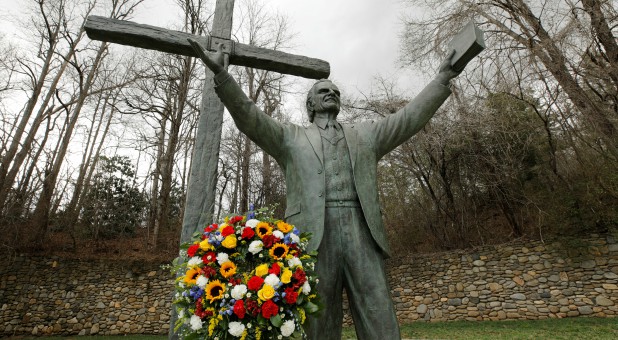What Made Billy Graham Stand Out
“Our country still needs Billy Graham. More than ever, we want his voice to echo on our evening news, to show up in our newspapers, to remind us that Jesus said, ‘You must be born again!’ The cry of Jeremiah the prophet is the cry that kept the great evangelist and his team moving in their advanced years: ‘The summer is ended, the harvest is past, and we are not saved.’ America is more than ever, ‘not saved.’ America needs Billy Graham.” —John Collins, Harvest Christian Fellowship
Over a public ministry career spanning more than six decades, William (Billy) F. Graham became a worldwide symbol of evangelism, faithfully preaching the gospel message of hope and salvation in Christ to more people in live audiences than anyone else in history—nearly 215 million people in 185 countries and territories. Of these, more than three million individuals came forward at the evangelist’s invitation to make a commitment to Christ.
Countless millions more were reached annually through a dozen or more national prime time crusade telecasts; weekly “Hour of Decision” radio broadcasts carried on as many as 1100 radio stations around the world; more than 130 Worldwide Pictures Gospel feature films; Decision Magazine, the nation’s second-largest religious publication with circulation reaching nearly two million; and the internet.
Beginning with his first city-wide campaign in Grand Rapids in 1947, Mr. Graham held a total of 417 crusades, averaging in length from four days towards the end of his public ministry to as long as 16 weeks at New York City’s Madison Square Garden in 1957. That historic outreach, his first of eight held in metro New York, is widely credited for establishing a national media presence for the evangelist, confirming his impact of using media as a tool for extending the gospel to as many people as possible. At the final rally that jammed Times Square, he based the theme of his message off movie titles on the theater marquees along 42nd Street, saying, “they reflected the emptiness of the times.”
Each of Graham’s crusades were held at the invitation of local churches, which he only accepted when he was assured of a broad base of support representative of all denominations in the region. Depending on dynamics in each local city, those invitations would come out of opportunity, necessity— even desperation.
Former crusade director Rick Marshall noted that every movement requires organization, but each Billy Graham crusade was actually an “organism,” formed for a season, biologically adapted to reflect the unique qualities, vitality and personality of a host city. Mr. Graham became a “local evangelist” able to address societal issues and felt needs indigenous to that region.
Mr. Graham was a “churchman,” who had a unique relationship with and unprecedented access to the faith community, crossing racial, confessional, denominational and geographic lines. Within the common denominator of evangelism, not ecumenism, he worked with—and had credibility and trust among — virtually every evangelical, charismatic, mainline and other Christian group, including Catholics in recent years. During his early ministry he helped define evangelicals, and later motivated mainline, liberal—even secular—pastors in evangelism and biblical preaching. During his travels, Mr. Graham also met with and gained the respect of leaders of other faiths.
Billy Graham crusades had a catalytic unifying effect among churches around shared priorities, mobilizing diverse groups to work together by emphasizing what they had in common, rather than issues that divided them. Beyond the millions of individuals who made faith commitments at his invitation to “come forward and make a commitment to Christ,” his crusades brought unity, visibility and credibility to the local church that continued long after the meetings concluded.
According to Susan Harding, anthropologist of religion at the University of California at Santa Cruz, Billy Graham “created a new way to be a conservative Christian, not fundamentalist, not a judgmental separatist. A Billy Graham Christian could be more educated, more worldly and take for granted that Christians have work to do in this world.”
Many ministry leaders and colleagues similarly observed that Billy Graham had a supernatural love for anyone he met, regardless of their religious background, or none. Even though his crusade outreach was always church-based, he worked hard to overcome the pressures and influence of religion.
“The greatest need of the church is to set it back 2,000 years to the time of Jesus,” Graham said famously, always mindful to keep the focus on Him.
As “evangelist to the world,” Billy Graham was perhaps best-known for his signature phrase, “The Bible says,” which provided the foundation for his faithful preaching at the intersection of faith and culture. Local media in crusade cities often described him “preaching with a Bible in one hand and a newspaper in the other,” contextualizing his message to show how the Word of God speaks to personal and societal problems.
Referencing how hard he worked to keep his sermons simple and clear, Time Executive Editor Michael Duffy remarked, “He had to put the message down where the goats could get it.” That was the key to Mr. Graham’s effective ministry, whose legacy will long be remembered as a life well lived and a Lord well-served. {eoa}
Larry Ross is president of A. Larry Ross Communications, a Dallas-based media/public relations agency founded in 1994 to provide cross-over media liaison at the intersection of faith and culture. For more than 33 years, he served as personal media spokesperson for evangelist Billy Graham, and is responsible for the website, billygrahamlegacy.info and curator of the video streaming channel, BillyGrahamLegacyYouTube.
















































